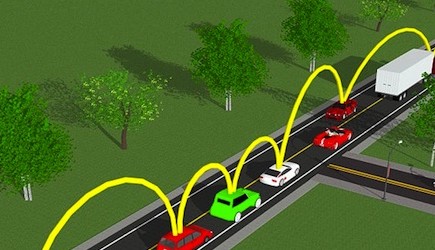Networked Cars Are Ready To Hit The Road
June 27, 2013
on
on

An extensive field test of the intelligent road system simTD has concluded successfully. Deployment of the German system will start on the Rotterdam - Frankfurt am Main - Vienna route in 2015.
The smart road system simTD enables cars to exchange information about traffic situations, driver behavior and external factors. Vehicle-to-vehicle and vehicle-to-infrastructure communication (car-to-x technology) creates better situational awareness to help drivers navigate traffic more safely and efficiently.
For instance, when a driver suddenly breaks hard, other road users receive a visual warning signal on their dashboard display. Data retrieved from roadside sensors informs drivers about road and weather conditions and navigation systems can anticipate upcoming traffic jams by suggesting alternative routes.
SimTD (Safe Intelligent Mobility – Test Field Deutschland) was tested over a 6 month period in and around Frankfurt in moving traffic. The field test was one of the world’s largest with 500 drivers manning 120 test vehicles driving a total of 1.6 million kilometers. The test yielded 4 terabytes of data which was analyzed by scientists of the Technische Universität München.
The TUM team predict –based on a simulated situation in which all vehicles are connected to the system- simTD could save Germany 11 billion euro annually. The biggest gain is in preventing traffic accidents from happening which saves 6.5 billion. Another 4.9 billion cost reduction comes from fuel savings and reduced CO2 emissions.
The cars and road infrastructure communicate over wireless LAN. The mobile phone technologies UMTS and GPRS are also integrated in simTD to fill the gap if WLAN fails. To protect data against illegitimate use vehicle communications are anonymized and encrypted.
The field test has proven that the car-to-x technology that turns vehicles into networked cars is ready for deployment. A limited implementation will be initiated along the Rotterdam - Vienna corridor in 2015 starting with a roadwork warning system. The Germans are looking to partner up with other European traffic authorities and corporations for a more extensive rollout.
Photo: Deutsches Zentrum für Luft- und Raumfahrt
The smart road system simTD enables cars to exchange information about traffic situations, driver behavior and external factors. Vehicle-to-vehicle and vehicle-to-infrastructure communication (car-to-x technology) creates better situational awareness to help drivers navigate traffic more safely and efficiently.
For instance, when a driver suddenly breaks hard, other road users receive a visual warning signal on their dashboard display. Data retrieved from roadside sensors informs drivers about road and weather conditions and navigation systems can anticipate upcoming traffic jams by suggesting alternative routes.
SimTD (Safe Intelligent Mobility – Test Field Deutschland) was tested over a 6 month period in and around Frankfurt in moving traffic. The field test was one of the world’s largest with 500 drivers manning 120 test vehicles driving a total of 1.6 million kilometers. The test yielded 4 terabytes of data which was analyzed by scientists of the Technische Universität München.
The TUM team predict –based on a simulated situation in which all vehicles are connected to the system- simTD could save Germany 11 billion euro annually. The biggest gain is in preventing traffic accidents from happening which saves 6.5 billion. Another 4.9 billion cost reduction comes from fuel savings and reduced CO2 emissions.
The cars and road infrastructure communicate over wireless LAN. The mobile phone technologies UMTS and GPRS are also integrated in simTD to fill the gap if WLAN fails. To protect data against illegitimate use vehicle communications are anonymized and encrypted.
The field test has proven that the car-to-x technology that turns vehicles into networked cars is ready for deployment. A limited implementation will be initiated along the Rotterdam - Vienna corridor in 2015 starting with a roadwork warning system. The Germans are looking to partner up with other European traffic authorities and corporations for a more extensive rollout.
Photo: Deutsches Zentrum für Luft- und Raumfahrt
Read full article
Hide full article


Discussion (0 comments)